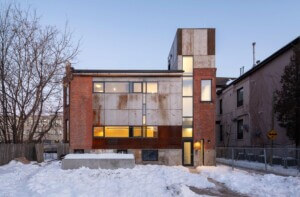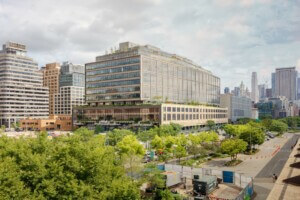Citing “unprecedented economic uncertainty,” Daniel L. Doctoroff, chief executive of urban innovation startup and Alphabet subsidiary Sidewalk Labs, announced today that plans to move forward with the highly contentious Quayside redevelopment project on the Toronto waterfront have been nixed.
Extending his gratitude to development partner Waterfront Toronto and the “countless Torontonians” who contributed to the project, Doctoroff laid out the reasoning behind the “difficult decision” in a statement published on Medium:
“For the last two-and-a-half years, we have been passionate about making Quayside happen—indeed, we have invested time, people, and resources in Toronto, including opening a 30-person office on the waterfront. But as unprecedented economic uncertainty has set in around the world and in the Toronto real estate market, it has become too difficult to make the 12-acre project financially viable without sacrificing core parts of the plan we had developed together with Waterfront Toronto to build a truly inclusive, sustainable community. And so, after a great deal of deliberation, we concluded that it no longer made sense to proceed with the Quayside project, and let Waterfront Toronto know yesterday.”
“While we won’t be pursuing this particular project, the current health emergency makes us feel even more strongly about the importance of reimagining cities for the future. I believe that the ideas we have developed over the last two-and-a-half years will represent a meaningful contribution to the work of tackling big urban problems, particularly in the areas of affordability and sustainability. This is a vital societal endeavor, and Sidewalk Labs will continue our work to contribute to it.”
The project, which would have transformed a 12-acre stretch of disused former dockland on Lake Ontario just east of Toronto’s downtown core, was first initiated by Waterfront Toronto in 2017. Sidewalk Labs, an organization headed by Bloomberg alum Doctoroff and funded by Google parent company Alphabet, won the bid to take on the waterfront-revitalizing mixed-use project.
With great sadness and disappointment we announce that @sidewalklabs will no longer pursue the Quayside project in Toronto. We’re grateful to @WaterfrontTO and all Torontonians who contributed to this effort these past 2.5 years. CEO @DanDoctoroff has more https://t.co/VrNI4cSCzM
— Sidewalk Toronto (@SidewalkToronto) May 7, 2020
While the Quayside development boasted all the hallmarks of an ambitious, forward-thinking urban redevelopment project— an agreeable amount of affordable housing, ample open public space, an overriding emphasis on green construction methods and micro-mobility, attractive design renderings furnished by firms including Heatherwick Studio and Snøhetta, and more—it was also poised to function, to significant controversy, as a living laboratory (or a Big Tech petri dish, perhaps) for a wide array of cutting-edge city tech solutions developed by Google. Sidewalk Labs itself referred to the planned neighborhood as “a testbed for emerging technologies, materials, and processes.”
Despite insistence by Sidewalk Labs that it had consulted with “thousands of Torontonians” in fine-tuning the scheme, pushback against the Quayside development master plan has been sharp. A September 2019 document published by Waterfront Toronto’s independent Digital Strategy Advisory Panel (DSAP), bemoaned that the futuristic and “frustratingly abstract” project relied too heavily on showcasing “tech for tech’s sake” while sidelining the basic needs and wants of users. The DSAP “felt that the plan did not appear to put the citizen at the centre of the design process for digital innovations, as was promised in the beginning and is necessary for legitimacy.” Concerns over privacy had also been brought up time and time again although Sidewalk Labs had promised not to use facial recognition technology or harness personal information for advertising within the development.
In a statement shared by CBC News, the Canadian Civil Liberties Association referred to the withdrawal of Sidewalks Labs “as a victory for privacy and democracy, clearing the way for that reset to take place.” Others opposed to the project have expressed similar elation.
Another point of controversy was an attempt to widen the scope of the lakefront development from 12 acres, the size first envisioned when Sidewalk Labs was tapped by Waterfront Toronto to spearhead the project, to 190 acres. Just a couple of months after Sidewalk Labs announced the super-sizing of the high-tech utopia to 16 times larger its original planned acreage, the company agreed to scale it back down.
“They had to work with us and not be adversarial if they were going to be successful,” said Stephen Diamond, chair of Waterfront Toronto, at the time. “They basically ceded to the most important threshold issues that we needed to get resolved to move forward.”
The project, which Sidewalk Labs had invested $980 million in as project developer, was still a good while out from securing a full governmental go-ahead before being scrapped by the company. Waterfront Toronto was also still in the process of mulling the latest iteration of the redevelopment proposal. That decision was to come in March but then pushed back to May due to the ongoing coronavirus crisis.
My statement on today’s announcement by @SidewalkLabs. pic.twitter.com/Hc8Hy5y6uZ
— John Tory (@JohnTory) May 7, 2020
City councilman and Waterfront Toronto board member Joe Cressy said in a statement that he was not given advance notice of Sidewalk Labs’ decision to walk away from the project, and just found out this morning.
“Over the past two years, Waterfront Toronto has invested a considerable amount of work in the development of Quayside,” he said. “Legitimate concerns were raised regarding Sidewalk Labs’ proposals, including concerns over data collection and digital governance.”
“While this does mean that Waterfront Toronto will start again to reimagine Quayside, none of this work will go to waste,” Cressy added. “The engagement and feedback we have received from residents and community organizations has given us a solid framework that will shape our work going forward.”
Diamond echos Cressy’s sentiments, emphasizing that the down-and-out swath of Toronto waterfront in question will still be home to a progressive new development in the future.
“Quayside remains an excellent opportunity to explore innovative solutions for affordable housing, improved mobility, climate change, and several other pressing urban challenges that Toronto—and cities around the world—must address in order to continue to grow and succeed,” Diamond said in a news release. “Today is not the end of Quayside, but the first day of its future. Waterfront Toronto will continue to seek public and expert input as we make a next generation community at Quayside a reality.”
A similar sense of optimism has also been expressed by some of those tapped by Sidewalk Labs to contribute to its vision for Quayside. Michael Green, principal of the eponymous Vancouver-headquartered architecture firm famed for its record-setting mass timber buildings, provided a statement to AN that puts a positive spin on today’s development:
“COVID has given us personally and professionally time to reflect. The economics of all of our businesses are changing. Sidewalk’s decision should also create a time for reflection. Are we a country of Process or a country of Progress? Sidewalk was buried in process that perhaps impacted their decision. Is that ok? Maybe not. Maybe we should reflect. Progress is exactly what COVID is challenging us to think about. Are we going to address climate and affordability or are we going to bog down in talking about it and not innovating and taking action. As policy changed to close roads for bikes and pedestrians or open outdoor seating for restaurants to help with social distance we are seeing cities transform before our eyes. The opportunity is to not let these temporary policy changes go backwards.”











